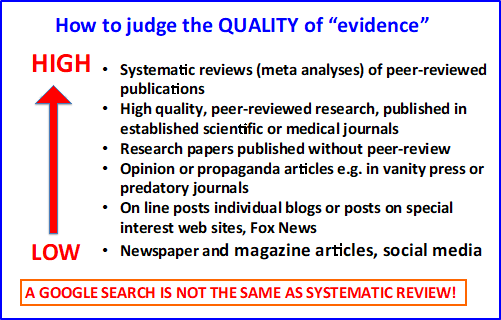To Seek Out the Facts, A Google Search May Not Be Enough
Renowned auditory researcher Dr. Robert Harrison brings us up to date on information and research from the Labs. Appropriately titled “From the Labs to the Clinics”, Bob is involved in laboratory and applied/clinical research, including evoked potential and otoacoustic emission studies and behavioural studies of speech and language development in children with cochlear implants. For a little insight into Bob’s interests outside the lab and the clinic, we invite you to climb aboard Bob’s Garden Railway.
We have entered a period of uncertainty. The COVID-19 pandemic and the Trump-era have revealed that too many fellow humans cannot easily tell fact from fiction or distinguish between scientific evidence and conspiracy theory. As a result, the media, political leaders, and those “in authority” can feed us fake news or real news, and many have difficulty recognizing the difference.
This ignorance (sorry, but I need to use that term) is a mistrust of science and a lack of understanding of the scientific process. For example, a claim that the COVID-19 virus doesn’t exist or is harmless when science tells us otherwise, vaccination causes death rather than prevents death, or the idea that chlorine bleach can cure a COVID infection. Much of the spread of misinformation results from lies posted online in social media channels or in corrupt mainstream media outlets masquerading as serious news channels (you know who I mean!).
In the “sane” world, even educated adults latch on to absurd ideas and unfounded myths, especially when it suits them. One arena where this happens and that I am familiar with relates to the health effects of wind turbine noise. Worldwide many attempts to establish wind turbine projects are delayed or thwarted by opposition claims that wind turbines cause serious illness. I have previously written in this column about my expertise around the health effects of wind turbines (see: Can wind turbine noise make you ill? Canadian Audiologist Vol 6(1)), and I am often called to explain what the scientific literature actually tells us (that there are no significant adverse health issues).
I attend meetings where opponents have done a “Google search” and found all sorts of “facts” that support their fears about illness from wind turbine noise. In reality, we have scores of very serious high-quality research studies that have found no evidence of illness, and many systematic reviews and meta-analyses provide an overwhelming consensus that wind turbines, when properly located, have no adverse effects on health.
In my discussions, I will show in Figure 1 to explain to the opponents the various sources of “evidence” and their quality. The low-level evidence and the sources that often convey conspiracy theories and myths are social media blogs and special interest websites. I teach the opponents that it is easy to “cherry-pick” an opinion that suits your cause. But to get the real facts, it is necessary to seek out peer-reviewed scientific publications in established medical journals or consult the many meta-analyses or systematic reviews. I remind them that a Google search is just not good enough.
I know that readers of this column will completely understand my sermon here. But, surprisingly, a number of our sane friends and colleagues may need some guidance on distinguishing fact from fiction (e.g., an election from a stolen election).


